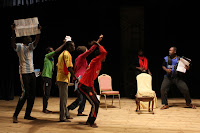On
the day of our actual performance, the whole event was shut down. The imam of
the main mosque had denounced the event on Holy Friday, the day before, and
that’s no small matter in Sudan. There were those in the government completely
against this entire exchange. I was in midst of teaching an additional class in
clowning at another location when the rumors reached us. I gathered my
students together and told them what might be happening. And I said what mattered
most was the experience we shared working together over the past 10 days. They said they would perform
the show somewhere no matter what and send me the video for me to see. We
arrived at the performance space with a mix of trepidation and excitement.
I saw military police stationed at the entrance and thought, "Uh oh, this is getting serious."
Our performance was in a huge parking lot next to a major conference
hall. It turned out the President was next door at a conference!
This was one of the reasons given for why we could not proceed with our
performance. Nonetheless, after much negotiation between our producers
and government representatives, the show was back on again.
However,
all the hold-ups delayed everything and we started really late. My
students waited and waited for their chance to present. (There were many
acts in the entire performance evening, including music, rap and hip hop
dance.) As we were getting ready we began to dance to the music playing.
One of the government representatives approached us and said "no
dancing."
(The
evening before, a government rep had told us all the women must wear
headscarves during the performance or they would cancel the whole show. Several of the women were very upset by
this and one flat out refused.
They compromised by wearing a hat and tucking in their hair. I wore a headscarf in solidarity. Otherwise, as a foreigner I was not
obliged to wear one (unlike my experience in Afghanistan). Indeed, not all Sudanese women wear headscarves, although I
would say it’s the practice of about 99% of women. Covering your hair is not explicitly required, but it can
be arbitrarily enforced by the authorities. Recently, a Sudanese woman was arrested for not wearing a
headscarf and is on trial facing a possible punishment of 40 lashes.)
And then, finally, it was my students' turn. They got on stage, began their
performance, and they rocked it. There were over a thousand people in the
audience (I was told as many as 3,000) who clapped, whistled and laughed in
recognition of what my students were presenting. After all the apprehension, this was so affirming and satisfying to witness, and I was so excited for the performers.
And then I was told we had to cut their performance short! The authorities mandated the whole event end at a certain time. The clock struck when my students were only halfway through their performance. I was the one who had to physically get up there on stage and stop them.
And then I was told we had to cut their performance short! The authorities mandated the whole event end at a certain time. The clock struck when my students were only halfway through their performance. I was the one who had to physically get up there on stage and stop them.
The
students were absolutely devastated. After working so hard for 10 days, after all the build-up and anticipation, they were finally getting to perform and have their say -- and then to have the rug pulled from under them! They got so upset they refused
to leave the stage and were near ready to riot. It was getting serious.
They shouted at me: “We leave this stage only because of you, Anna,
because of you; otherwise we refuse!” It was heart-wrenching.
In the midst of this the organizer tells me, “You must leave now!” and I was immediately
whisked off to the airport for my scheduled flight. I had no opportunity
to gather the students and talk about what happened and say goodbye.
Normally I would take time for a debrief, which is something very important to
do at the end of a project, especially one as intensive as this one. It was
really hard to leave in such a state of incompletion. I quickly handed a stack
of certificates to Hashim for distribution -- and he reached out and hugged me.
This set off a chain-reaction of spontaneous embraces. No words, simply
the most deeply heartfelt hugs. It affirmed for me that even in the face
of this terrible breakdown our bond was not broken. It is difficult to
put into words the mix of emotions of the deeply meaningful exchange that had
taken place between us, so suddenly cut short.
*
* *
I
have since been in communication with them. They are in good spirits and ready
to perform the piece again elsewhere. They said: "We are artists and we
are strong, we have a message to show the world and you showed us how to give
it out."
This
was truly one of the most rewarding experiences I’ve had teaching and traveling
abroad, and trying to make a difference in the world. It’s been a
privilege to experience Sudan and its people, and to get to work with these
beautiful and talented individuals. I hope to be able to come back
soon again. If I'll get another visa... There has been a lot of
controversy in the local press and government in Sudan about our program.
Our supporters in the government are still defending the program – they
are the ones facing the consequences now (among them Mr. Obay who turned out to
be an ally and advocate) – I hope they prevail!














